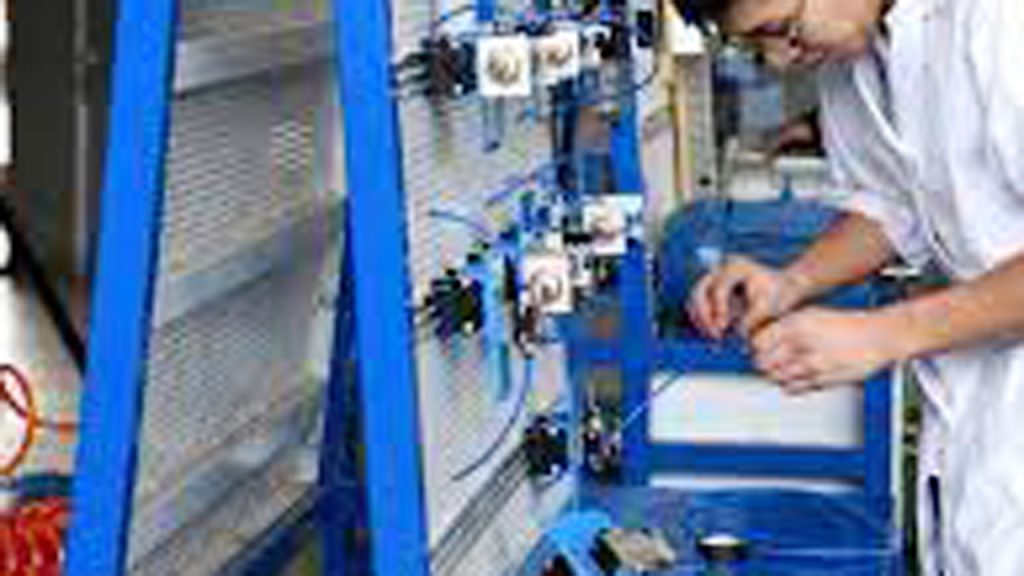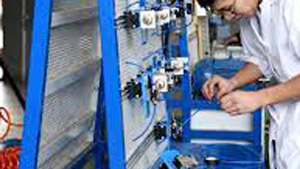Technical education plays a pivotal role in shaping individuals for success in today’s rapidly evolving world. But what exactly is technical education? In simple terms, it refers to the acquisition of practical skills and knowledge to perform specific tasks or trades. Whether it’s learning the intricacies of coding, mastering engineering principles, or acquiring expertise in a specific trade, technical education equips individuals with the hands-on skills needed to excel in their chosen field.
With technological advancements and automation disrupting industries, technical education has become more vital than ever. It empowers individuals to stay ahead of the curve, adapt to changing job markets, and seize lucrative opportunities. By offering practical training and real-world experience, technical education bridges the gap between theory and application, preparing learners to meet the demands of modern workplaces.

Image by thedialogue.org
Technical education not only enhances employability but also fosters innovation and entrepreneurship. By equipping individuals with the skills to create and innovate, it drives economic growth and societal development. So whether you’re considering a career switch, expanding your skillset, or pursuing your passion, technical education opens doors to a world of possibilities. Embark on this enriching journey, and unlock your true potential with technical education.
Definition and Overview of Technical Education
Technical education encompasses a wide range of disciplines and fields, all aimed at equipping individuals with the practical skills necessary to succeed in the workforce. From vocational training programs to specialized technical institutions, technical education offers a diverse range of opportunities for learners.
One of the key aspects of technical education is its focus on hands-on learning. Unlike traditional education, which primarily emphasizes theoretical knowledge, technical education places a strong emphasis on practical application. This allows learners to develop a deep understanding of the subject matter through real-world experiences and problem-solving.
Technical education programs are designed to provide learners with the knowledge and skills needed to perform specific job roles or trades. Whether it’s learning to operate complex machinery, designing and building structures, or developing software applications, technical education equips individuals with the expertise required to excel in their chosen field.
Importance of Technical Education in Today’s Society
In today’s rapidly changing world, technical education has become increasingly important. As technology continues to advance and industries become more specialized, there is a growing demand for individuals with practical skills and expertise. Technical education bridges the gap between academic knowledge and practical application, ensuring that individuals are well-prepared to meet the challenges of the modern workforce.
One of the key advantages of technical education is its focus on employability. By providing learners with practical skills that are directly applicable to the job market, technical education enhances their chances of finding meaningful employment. From trade-specific skills to in-demand technical expertise, employers value individuals who have received technical education, as they are seen as more prepared and capable of contributing to the success of a company.
Technical education fosters innovation and entrepreneurship. By equipping individuals with the skills to create and innovate, technical education drives economic growth and societal development. It empowers individuals to develop and implement new ideas, leading to advancements in technology, industry, and various sectors of the economy.
Advantages and Disadvantages of Technical Education
Like any form of education, technical education has its advantages and disadvantages. Understanding these can help individuals make informed decisions about their educational path and career choices.
One of the main advantages of technical education is its emphasis on practical skills. Technical education programs provide hands-on training and real-world experience, allowing learners to develop the expertise needed to excel in their chosen field. This practical focus enhances employability and prepares individuals for the demands of the workforce.
Another advantage of technical education is its relatively shorter duration compared to traditional academic programs. While traditional education often requires several years of study, technical education programs can be completed in a shorter timeframe. This allows individuals to enter the workforce sooner and start building their careers.
Technical education also has its disadvantages. One potential drawback is the perceived lack of flexibility. Technical education programs are often specialized and focused on a specific trade or skill set. This can limit individuals’ options if they decide to switch careers or pursue different opportunities later in life.
Technical education may be seen as less prestigious compared to traditional academic programs. Society often places a higher value on degrees from universities and colleges, leading to a bias against technical education. This misconception can hinder individuals from pursuing technical education, despite its numerous benefits.
Types of Technical Education Programs and Institutions
Technical education programs and institutions come in various forms, catering to different interests and career goals. These include vocational training programs, technical colleges, trade schools, and specialized institutes. Each offers unique opportunities for individuals looking to acquire practical skills and knowledge for a specific trade or profession.
Vocational training programs are often offered in partnership with local industries or trade unions. These programs focus on providing practical training and hands-on experience in specific trades, such as carpentry, plumbing, electrical work, automotive repair, and more. Vocational training programs typically combine classroom instruction with on-the-job training, ensuring that learners develop the necessary skills to succeed in their chosen trade.
Technical colleges and trade schools offer a broader range of technical education programs. These institutions provide specialized training in fields such as engineering, computer science, healthcare, culinary arts, and many others. Technical colleges often offer associate degrees or diplomas, while trade schools typically offer certificates or specialized training programs.
Specialized institutes cater to individuals interested in highly specialized technical fields. These institutes focus on providing in-depth training and expertise in areas such as information technology, aviation, design, and more. Specialized institutes often offer advanced diploma or certification programs that equip individuals with the skills and knowledge required for specific industries.
Technical Education vs. Traditional Education
Technical education and traditional education differ in their objectives, teaching methods, and outcomes. While traditional education focuses on providing a broad-based academic foundation, technical education is more specialized and practical in nature.
Traditional education primarily emphasizes theoretical knowledge and critical thinking skills. It aims to provide a well-rounded education that prepares individuals for a wide range of careers and further academic pursuits. Traditional education programs typically include general education courses, such as mathematics, science, humanities, and social sciences, alongside specialized courses in a chosen field of study.
Technical education, on the other hand, is more focused on providing practical skills and hands-on training. It aims to equip individuals with the specific knowledge and expertise required for a particular trade or profession. Technical education programs often include a combination of theoretical instruction, practical training, and real-world experience.
Both forms of education have their merits and serve different purposes. Traditional education provides a broad-based foundation that can be applied to various fields, while technical education offers specialized skills and knowledge directly applicable to specific industries.
Skills and Subjects Covered in Technical Education
Technical education covers a wide range of skills and subjects, depending on the chosen field of study. These can include:
Engineering and Technology
Technical education programs in engineering and technology cover subjects such as electrical engineering, mechanical engineering, civil engineering, computer science, and more. These programs equip individuals with the knowledge and skills needed to design, build, and maintain various structures, systems, and technologies.
Information Technology
Technical education programs in information technology focus on subjects such as software development, network administration, cybersecurity, database management, and more. These programs provide individuals with the skills to develop and manage technology systems and applications.
Healthcare
Technical education programs in healthcare cover subjects such as nursing, medical assisting, dental hygiene, radiology, and more. These programs prepare individuals for careers in the healthcare industry, equipping them with the skills and knowledge needed to provide patient care and support.
Trades and Vocational Skills
Technical education programs in trades and vocational skills cover a wide range of subjects, including carpentry, plumbing, welding, automotive repair, HVAC (heating, ventilation, and air conditioning), and more. These programs provide individuals with the practical skills necessary to work in specific trades.
Creative Arts and Design
Technical education programs in creative arts and design cover subjects such as graphic design, fashion design, interior design, culinary arts, and more. These programs equip individuals with the skills to create and innovate in various creative industries.
These are just a few examples of the skills and subjects covered in technical education. The breadth and depth of technical education programs ensure that individuals receive comprehensive training in their chosen field of study.
Career Opportunities and Job Prospects in Technical Fields
Technical education opens up a wide range of career opportunities and job prospects. The practical skills and knowledge acquired through technical education programs are highly valued by employers across various industries.
In the field of engineering, technical education provides individuals with the expertise to work in roles such as electrical engineer, mechanical engineer, civil engineer, software engineer, and more. These professionals are responsible for designing, building, and maintaining various structures, systems, and technologies.
In the information technology sector, technical education equips individuals with the skills to pursue careers as software developers, network administrators, cybersecurity specialists, database administrators, and more. These professionals play a crucial role in developing and managing technology systems and applications.
In healthcare, technical education programs prepare individuals for careers as nurses, medical assistants, dental hygienists, radiology technicians, and more. These professionals provide essential care and support to patients in various healthcare settings.
Trades and vocational skills acquired through technical education programs open up opportunities in fields such as carpentry, plumbing, welding, automotive repair, HVAC, and more. Skilled tradespeople are in high demand, and these professions offer stable and rewarding career paths.
Technical education also offers opportunities in creative arts and design. Individuals with technical education in graphic design, fashion design, interior design, culinary arts, and other creative fields can pursue careers as designers, artists, chefs, and more. These professions allow individuals to showcase their creativity and passion while making a meaningful impact in their respective industries.
Challenges and Misconceptions Surrounding Technical Education
Despite its numerous benefits, technical education faces certain challenges and misconceptions. One of the main challenges is the perception that technical education is inferior to traditional academic education. Society often places a higher value on degrees from universities and colleges, leading to a bias against technical education. This misconception can discourage individuals from pursuing technical education, despite its practicality and employability.
Another challenge is the limited awareness and understanding of technical education programs. Many individuals are unaware of the diverse range of opportunities available through technical education. This lack of information can result in individuals making uninformed decisions about their educational path and career choices.
Technical education programs may face challenges in keeping up with rapidly evolving industries and technologies. As industries continue to advance and new technologies emerge, technical education programs must adapt and update their curriculum to ensure that learners are equipped with the latest skills and knowledge.
To address these challenges, it is crucial to raise awareness about the value and benefits of technical education. Governments, educational institutions, and industry leaders should collaborate to promote technical education as a viable and valuable educational pathway. By showcasing success stories, highlighting career opportunities, and providing support and resources, we can overcome the challenges and misconceptions surrounding technical education.
Promoting and Supporting Technical Education
Promoting and supporting technical education requires a multi-faceted approach involving various stakeholders. Here are some key strategies to promote and support technical education:
Raising Awareness
Governments, educational institutions, and industry leaders should collaborate to raise awareness about the value and benefits of technical education. This can be done through targeted marketing campaigns, community outreach programs, and partnerships with local industries.
Career Guidance and Counseling
Providing access to comprehensive career guidance and counseling services can help individuals make informed decisions about their educational path and career choices. This includes providing information about technical education programs, career opportunities, and job prospects.
Industry Partnerships
Collaborating with industry partners is crucial for ensuring that technical education programs align with industry needs. By establishing partnerships with local industries, educational institutions can develop curriculum that is relevant and up-to-date, ensuring that learners are equipped with the skills and knowledge required by employers.
Scholarships and Financial Support
Offering scholarships and financial support can help make technical education more accessible to individuals from diverse backgrounds. This can include providing tuition assistance, grants, and loans specifically for technical education programs.
Continuous Learning and Professional Development
Technical education programs should emphasize the importance of continuous learning and professional development. By providing opportunities for learners to update their skills and knowledge, technical education programs can ensure that individuals remain competitive in their respective fields.
By implementing these strategies, we can create an environment that promotes and supports technical education, ensuring that individuals have the resources and opportunities to pursue a successful career in their chosen field.
The Future of Technical Education
As we navigate the rapidly evolving world, technical education will continue to play a vital role in preparing individuals for success. The practical skills and knowledge acquired through technical education programs are highly valued by employers across various industries. Technical education fosters innovation, drives economic growth, and opens up a world of possibilities for individuals.
To fully unlock the potential of technical education, it is crucial to address the challenges and misconceptions surrounding it. By raising awareness, providing comprehensive career guidance, establishing industry partnerships, offering financial support, and emphasizing continuous learning, we can ensure that technical education remains a viable and valuable educational pathway.
So whether you’re considering a career switch, expanding your skillset, or pursuing your passion, technical education is a gateway to a world of opportunities. Embark on this enriching journey, embrace practical learning, and unlock your true potential with technical education. The future awaits, and technical education will be there to guide you towards success.




